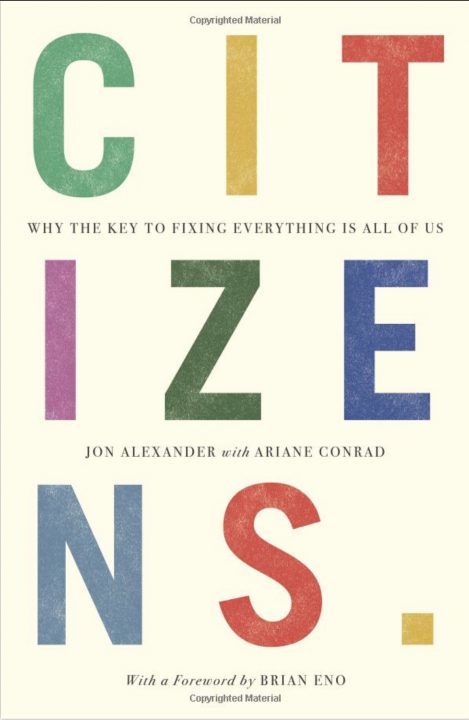Citizens: Why the Key to Fixing Everything Is All of Us Jon Alexander with Ariane Conrad ( Canbury Press, £20)
With pandemic, war, economic problems and ecological crises piling up, we find ourselves – not for the first time in history – with tough decisions to make, and here is the latest in a line of books by progressive thinkers, suggesting collective response.
Inspiring such collective action is a tough call in an era of growing individualism, as co-author Jon Alexander knows too well – a former ad man until he lost his stomach for the industry’s excesses, he was a footsoldier in the consumer culture that helped to undermine our collective spirit. He now believes that we need to stop seeing ourselves as consumers, and start acting, on a daily basis, as citizens to meet the world’s challenges.

Co-operators have long advocated the telling of stories to promote the movement’s strengths, and Alexander values narrative. Co-written with ‘book doula’ Ariane Conrad, this book sees the history of human identity as one of changing stories: for much of history the dominant narrative was the Subject Story, placing people under the authority of a crown; the Consumer Story offered a liberation from this but now “in order to survive and thrive, we must step into the Citizen Story”.
Citizens, he says, are “people who actively shape the world around us, who cultivate meaningful connections to their community and institutions, who can imagine a different and better life, who care and take responsibility, and who create opportunities for others to do the same.”
The path to this is not a clear one. If the pandemic inspired citizen efforts, it also prompted consumer-based government initiatives like the UK’s then-chancellor Rishi Sunak’s Eat Out To Help Out scheme. And businesses which won praise for their ethical stance, such as BrewDog, have often found themselves mired in ethical problems.
Retail co-ops also have one foot in the citizen and consumer camps, and Alexander uses his notion of the two stories to shed fresh light on the crisis at the Co-op Group that led to the loss of the Co-op Bank.
He notes that the citizen ethos was part of the Co-op at its inception in Rochdale. But “as the Consumer Story took hold … and challenges to market share arose from the fast-growing supermarket chains, the model began to creak, and ultimately power flooded in from the local to the central.”
Related: UKSCS conference looks at consumer co-ops in the age of the citizen
The centralisation process, starting in the 1960s, led to “a corporation called the Co-op Group”, says Alexander – a “ big beast, which was far more distant and less relatable”.
The Bank, he argues, “was at the epicentre of the problem. When power poured into what had been the CWS, all the various governance structures were simply thrown together, and resulted in a huge bank governed by a board arguably akin to the worst kind of parish council, its members more motivated by perceived status than meaningful opportunities to contribute.”
Alexander’s response to such events was to help launch the New Citizenship Project (NCP), which has been working with the Group – as well as organisations such as the National Trust and the BBC – to encourage more participation by members and users. With the Group, NCP has “crowdsourced recipes for new food products, co-created a new travel insurance offering, invited widespread input into its new food sourcing policy, and much more”.
A highlight, he says, is the work during the pandemic of the Group’s Member Participation team to establish a network of online, member-led 229 ‘grief cafés,’ where members come together to share an online space to feel less alone.
Alexander sees the co-op model as a useful driver for the citizenship ethos, and also highlights newer ideas like platform co-operativism and the campaign for citizen-controlled social media platforms.
If co-operation is a useful mechanism for Alexander, his citizen stories also offers inspiration for co-ops. He compiles moving case studies of individuals coming together to improve their communities – from a residents’ group in Grimsby to activists in a slum on the edge of Nairobi, Kenya, working to tackle sexual violence, clean streets and launch small businesses. He’s realistic about the barriers to progress, but he takes an optimistic view of human nature and argues that we need to roll up our sleeves to make change happen.
“This work of transformation is not easy,” he writes. “We have to get beyond the usual suspects of mission statements, supply chains, diversity initiatives. We have to go beneath the surface, and rebuild from the inside out. We have to get into the detail. This is because, even having recognised the Citizen in ourselves and others as individuals, the gravitational pull of business-as-usual in entrenched institutions can still drag us back to the old ways of doing things.”

